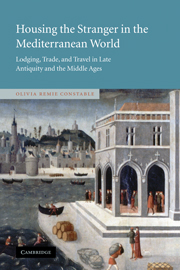 Housing the Stranger in the Mediterranean World
Housing the Stranger in the Mediterranean World Published online by Cambridge University Press: 27 August 2009
In contrast to the relatively scant references during the early Islamic period, the funduq flourished throughout the Muslim Mediterranean world by the eleventh and twelfth centuries. Arabic and Judeo-Arabic texts from Ayyūbid Syria to Almoravid Spain frequently mention funduqs and other hostelries, making clear that these were a common and established component of urban infrastructure. Major trading cities might have a hundred or more funduqs within their walls, and the geographer al-Idrīsī reported an astonishing 970 funduqs in the Andalusi port of Almería in about 1150.
Although ubiquitous, funduqs remain a little-studied, and thus poorly understood, element of Muslim urban society and economy. What was their function? Data on funduqs from the eleventh, twelfth, and thirteenth centuries show the maturation of trends that were already perceptible in the early Islamic period. First and foremost, funduqs were commercial spaces, serving the needs of merchants for lodging, storage, and security. They also functioned as sites where urban administrators could collect taxes on commercial transactions, regulate the distribution of certain goods, and monitor the activities of merchants. Meanwhile, these hostelries also provided charitable accommodation, sheltering pilgrims and the poor, or they generated income for pious endowments (waqfs). After a survey of these commercial and charitable functions, the chapter considers the architecture, amenities, and administration of funduqs; their ongoing association with drinking, prostitution, and crime; and their role in fostering communal identities in the medieval Islamic world.
To save this book to your Kindle, first ensure no-reply@cambridge.org is added to your Approved Personal Document E-mail List under your Personal Document Settings on the Manage Your Content and Devices page of your Amazon account. Then enter the ‘name’ part of your Kindle email address below. Find out more about saving to your Kindle.
Note you can select to save to either the @free.kindle.com or @kindle.com variations. ‘@free.kindle.com’ emails are free but can only be saved to your device when it is connected to wi-fi. ‘@kindle.com’ emails can be delivered even when you are not connected to wi-fi, but note that service fees apply.
Find out more about the Kindle Personal Document Service.
To save content items to your account, please confirm that you agree to abide by our usage policies. If this is the first time you use this feature, you will be asked to authorise Cambridge Core to connect with your account. Find out more about saving content to Dropbox.
To save content items to your account, please confirm that you agree to abide by our usage policies. If this is the first time you use this feature, you will be asked to authorise Cambridge Core to connect with your account. Find out more about saving content to Google Drive.